Roxanne Dunbar-Ortiz is a historian, writer, and professor emeritus in Ethnic Studies at California State University. She is author or editor of 15 books, including Roots of Resistance: A History of Land Tenure in New Mexico and the literary memoir trilogy: Red Dirt: Growing Up Okie; Outlaw Woman: A Memoir of the War Years, 1960-1975; and Blood on the Border: A Memoir of the Contra War, and her award winning 2014 book, An Indigenous Peoples’ History of the United States. Her most recent book is Loaded: A Disarming History of the Second Amendment. Forthcoming is a book on the US claim to be “a nation of immigrants.”
“Settler Colonialism as Genocide”
The history of the United States IS a history of settler colonialism. The objective of settler-colonialism is to terminate and replace the presence of Indigenous Peoples as peoples—not as random individuals. This is the very definition of genocide. So, what constitutes genocide? It is sometimes incorrectly thought that genocide means the complete and definitive destruction of a race or people. The Genocide Convention, however, defines genocide as any killings on the basis of collective identity, or, in its specific words, as ‘killing members of the group.’ Any intent to destroy, in whole or in part, a national, racial, ethnic or religious group is genocide, according to the Convention. Also, the Convention states, ‘causing serious bodily or mental harm to members of the group,’ is genocide as well as ‘killing members of the group, and creating conditions that lead to the viability of the group to function. The terms of the genocide convention are essential for historical analysis of the effects of European and Euroamerican colonialism, particularly Anglo-American settler-colonialism that led to the establishment of the United States, inherently committed to elimination of the Indigenous nations, but also including the transatlantic slave trade, slavery, and the situation of descendants of enslaved Africans, the annexation of half of Mexico and contemporary treatment of Mexicans/Mesoamerican. But most importantly, the Genocide Convention is applicable to US policies and actions today, and since 1988, when the US Senate ratified it, 40 years after its issuance. There is no statute of limitations once the convention is ratified.
